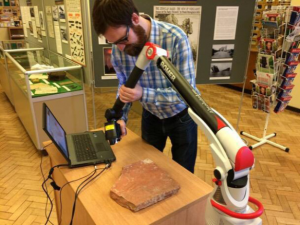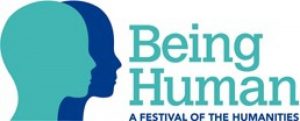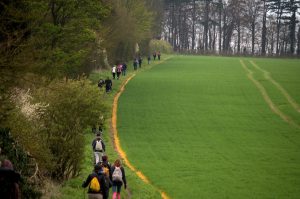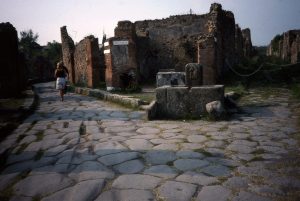People have an insatiable curiosity and inventiveness to create and to analyse what it is to be human. The 2nd National Festival of the Humanities (Being Human) brings the work of academics at the University of Kent out of the campus and within the reach of the public – in the very centre of Canterbury – at the Canterbury Roman Museum and the Beaney House of Art and Knowledge (from 18-24 November).
The festival makes the work of staff and PhD students from the Department of Classical and Archaeological Studies accessible to the public. Going to an event, will quite literally cause you to think about things differently or to share your ideas about things as varied as the smells of the past through to the technologies behind 3D printing. The focus of the events is upon artefacts from the Roman past, often found in Canterbury – a Roman town – in excavations by Canterbury Archaeological Trust. To understand and articulate our thoughts about the past, a poet – Dan Simpson – will hold workshops to find a voice for our thoughts that are stimulated by looking into the past.
There are also two walks led by PhD students from the University of Kent. 18 months ago, Julia Peters left Canterbury to walk the Via Francigena to Rome in just less than 80 days. She will be sharing her experiences by walking with the public on the first section of the route to Dover. Paula Lock will be exploring the smells of the past in a walk through Canterbury. Walking is a human action that is fundamental to the human experience.
There will also be a panel discussion of the Hopes and Fears of the Humanities that will be led by Dr Simon Kirchin – the Dean of the Faculty of Humanities following the showing of the film: What is Humanities Research at the University of Kent? Brexit, the distrust of experts, and a priority given to STEM subjects may cause those in the Humanities to fear for the future. Amongst the panellists will be Professor April McMahon, Deputy Vice-Chancellor (Education) at Kent, and herself a researcher in Linguistics. She stresses the enduring value of the humanities in challenging times:
‘I can understand why there might be fear for the future, but I am determined that we should stress the benefits people derive from humanities research. Our lives are enhanced by our experiences in reading literature, finding out about the histories of people and places, going to the theatre, and discussing our pasts and futures, characters and beliefs. But it’s not just about those engaging experiences – we gain so much more if we make the effort not simply to consume, but to understand. Humanities research helps us to do exactly that, adding a richness to our experiences, whether we are in a context of hopes or fears’.
There is a place for the Humanities in the work-life balance of the 21st century and the new dynamics of ageing, in which our life expectancy is increasing. We need to keep a focus on explaining what it is to be Human and what it is to exist within a culture, as well as within a balance sheet. Both are a set of values that are needed for our existence. The Humanities, in short, has a key role in understanding or making sense of what it is to be human and to explain the creativity of humanity. This need not be some abstract notion that is inaccessible to the public. Instead, through a focus on our shared cultural assets found in Canterbury’s Museums, we can bring about new forms of contact and collaboration between Universities and the public. Through the festival, the thoughts and discoveries of academics at Kent are communicated to the public, but this is done in anticipation of a response – for example the creation of new poetry to articulate in words the relevance of objects and actions from the past for the present.
For Professor Ray Laurence, the organiser of the Being Human 2016 events in Canterbury, the realisation of the importance of explaining human actions struck him, when he was a student and visited Pompeii:
‘The visit focussed on the art found in houses throughout the city, but that did not spark my curiosity. Instead, it was the sense of place that I felt standing in the streets of the city and a desire to find a way to analyse an ancient city’s built environment. ‘
‘Years later with two books published on Pompeii, I am still amazed by the human creativity that we can find in the houses and streets of Pompeii. These people from the past really did imagine the improbable and sought to make it possible, which can be seen so clearly in the houses of Pompeii. They were quite simply creating a new architecture that culminated in the magnificent beauty of structures such as the Pantheon in Rome that cannot fail to move the visitor today. That to me, is what it is to be human and why I believe that what I do as an academic has an intrinsic value that is only realised when it is shared with others, whether students or academics, schoolchildren and teachers, or the wider public .’
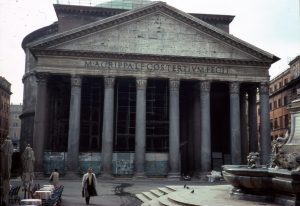
Book to join the debate on Tuesday 22 November: https://alumni.kent.ac.uk/events/registration-hopesandfears-humanities
For full programme of Being Human 2016 in Canterbury: http://beinghumanfestival.org/?s=university+of+kent
Blogs associated with Being Human 2016 in Canterbury: https://blogs.kent.ac.uk/clas/
Blog about ancient Rome: https://blogs.kent.ac.uk/lucius-romans/

